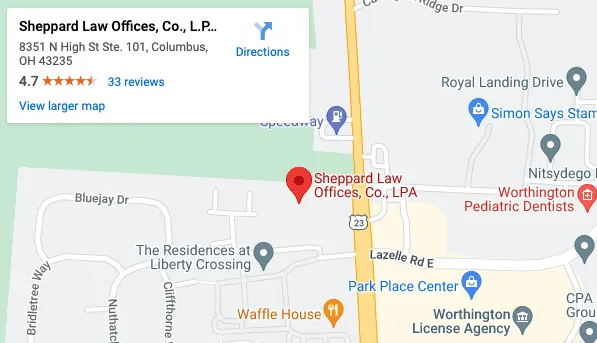Many people are not entirely aware of the repercussions of not paying their taxes. Some people will pay later when they have the time and money to do so if they don’t have the money or the means to do so now.
Sadly, the Internal Revenue Service isn’t exactly so relaxed in pursuing the taxes you owe. You might be shocked to find that the government can seize your personal property if you don’t pay your taxes.
Our tax lien lawyers at Sheppard Law Offices is committed to assisting its customers in resolving disagreements with the IRS. Remove tax liens or take immediate action to address other tax difficulties.
Before it’s too late, contact a Columbus, OH Tax Lien Attorney if you want to maintain your property.
Why Do I Need a Columbus, OH Tax Lien Attorney?
Real estate law and tax law, two extremely complicated fields of law, are often extremely focused on tax lien concerns. They frequently entail a variety of complicated legal issues as well, making it challenging to resolve them without a tax lien attorney’s help. As a result, it may be in your best interest to seek legal counsel from a Columbus, OH tax lien attorney if you are having issues with a tax lien.
Working with a Columbus, OH tax lien attorney that has experience resolving difficulties involving tax lien properties can help you achieve a reasonable compromise with the IRS, ensure that you adhere to all tax lien regulations, and determine whether your debt can be removed or decreased.
Your attorney can also confirm that the seized property is not exempt from seizure under applicable state laws. They can also assist you with the steps required to challenge a government agency’s decision.
Contact our law firm in Ohio with three different locations in Columbus (main), Mount Vernon, and Newark to schedule your free initial consultation.
What isTax Lien?
A lien is often thought of as a legal claim against a specific piece of property. Usually, liens are used to ensure that a debt is paid (e.g., loans). A tax lien is a specific kind of lien that the government files against the assets of a person or an organization that doesn’t pay its taxes. Thus, the government may place a lien on a person’s or an organization’s assets if they refuse to pay their taxes.
The government may take possession of the assets to which the lien is linked if an individual or entity continues to withhold payment of taxes despite the existence of a lien. Then, they can sell them to recuperate a portion or all of the outstanding debts.
A government agency may use a legal process known as a “tax levy” to seize the assets listed in the lien documents if a tax lien has already been filed against the assets and the person or firm has disregarded repeated requests for tax payment. Tax levies are the actual actions of seizing the assets of the individual or entity.
Lien Process
Before placing a tax lien, the IRS must complete three steps.
- The IRS will first determine a taxpayer’s debt.
- The IRS next files a “Notice of Federal Tax Lien” informing the taxpayer and their creditors that the government has a legal interest in the taxpayer’s assets.
- The IRS then issues a “Notice and Demand for Payment” explaining the tax debt and informing the taxpayer that they must pay it.
What is Federal Tax Lien?
When you disregard or refuse to pay a tax debt, the government will have a legal claim on your property known as a federal tax lien. The government’s interest in all of your possessions, including real estate, personal property, and financial assets, is protected by the lien. There is a federal tax lien when:
The IRS
- assesses your liabilities and records the balance you owe;
- sends you a bill (Notice and Demand for Payment) explaining the amount you owe; and
You
- neglect or refuse to pay the obligation in full by the due date.
In order to inform creditors that the government has a legal claim to your property, the IRS issues a public document called the Notice of Federal Tax Lien.
How to Remove a Lien?
The best way to remove a federal tax lien is to pay your tax debt in full. After you pay your tax debt, the IRS discharges your lien within 30 days.
Other options for lessening the burden of a lien exist when the circumstances are in the best interests of the government and the taxpayer.
Discharge of Property
A “discharge” clears the lien from a particular piece of property. Eligibility is determined by a number of Internal Revenue Code (IRC) provisions.
Subordination
While “subordination” does not actually remove the lien, it can allow other creditors to proceed ahead the IRS, potentially making it simpler to obtain a loan or mortgage.
Withdrawal
A “withdrawal” ensures that the Internal Revenue Service is not competing for your property with other creditors while also removing the public Notice of Federal Tax Lien; nonetheless, you are still responsible for paying the outstanding balance.
The Commissioner’s 2011 Fresh Start initiative led to the creation of two additional Withdrawal options.
After the lien has been released, one alternative can let you withdraw your Notice of Federal Tax Lien. Included in general eligibility are:
- Your lien has been released and your tax debt has been paid; in addition:
- For the past three years, all of your individual, business, and information returns have been filed on time;
- You have made all required federal tax deposits and estimated tax payments on time.
In the event that you have entered into or converted your regular installment arrangement to a Direct Debit installment agreement, the other alternative might permit removal of your Notice of Federal Tax Lien. Included in general eligibility are:
- You are a taxpayer who are qualified (i.e. people, businesses with income tax liability only, and out of business entities with any tax debt types)
- You owe no more than $25,000 (if you owe over $25,000, you may pay the difference before asking for the Notice of Federal Tax Lien to be withdrawn).
- The amount you owe must be fully paid off via your Direct Debit Installment Agreement within 60 months or before Collection Statute expires, whichever comes first.
- All other payment and filing requirements are fully met by you.
- You have paid by direct debit three times in a row.
- You cannot currently be in default on a Direct Debit Installment agreement or have ever been.
How Does Bankruptcy Affect a Tax Lien?
An individual or entity may file for bankruptcy as a sort of legal action to have some debts held against them reduced or eliminated. Any creditors who are owed money must cease collection attempts if a debtor is successful in filing for bankruptcy. Therefore, if the debtor files for bankruptcy and the Internal Revenue Service or a state government agency imposes a tax lien against the debtor’s property, the agency will have to release the lien from the property.
However, when a debtor has successfully completed the bankruptcy procedure, a government body might be allowed to place a new lien on their property. In this case, declaring bankruptcy is a temporary stopgap measure before the debtor’s assets are seized.
Finally, while it is not required to employ a tax attorney to help with this process, it is highly advised that anyone seeking bankruptcy relief do so. There are many distinct sorts of bankruptcy filings, and breaking the law can have serious repercussions. Therefore, hiring a tax lawyer can stop these repercussions from happening.
Handling Tax Liens After Bankruptcy
In general, you have the following options if a federal tax lien is still in force after filing for bankruptcy:
- paying the tax lien and get a release
- to relieve the tax lien, agree on a payment schedule or make a compromise.
- redeem a specific item by making a payment to the IRS equal to its worth as established by the bankruptcy court.
- by declaring Chapter 13 bankruptcy following your Chapter 7 bankruptcy (sometimes known as a “Chapter 20” bankruptcy), you can settle the tax lien over time, or
- if you do nothing, you run the risk of the IRS taking legal action to enforce its tax lien.
When the value of the property subject to a tax lien is nominal and your personal liability for the tax obligation has settled, it may make sense to do nothing.
Call our Columbus, OH Tax Lien Attorney Now!
Tax issues are frequent, and you can’t wish a problem away. If you wish to persuade the IRS or state government to release the lien it has imposed on your property, you must confront these difficulties head-on.
Tax problems are difficult to resolve, and the procedure is overwhelming. A tax lien lawyer may often make all the difference in helping people who are struggling with tax liability resolve their problems more swiftly and with less stress than if they tried to tackle the case on their own.
Our Columbus, OH tax lien lawyers at Sheppard Law Offices can advise you on the best course of action and represent you in court if you need to file a lawsuit related to a tax lien.
We can assist you in removing the lien by negotiating a payment plan or in obtaining other tax relief measures.
To schedule your free initial consultation, get in touch with our Ohio law firm, which has offices in Newark, Mount Vernon, and Columbus (main).


